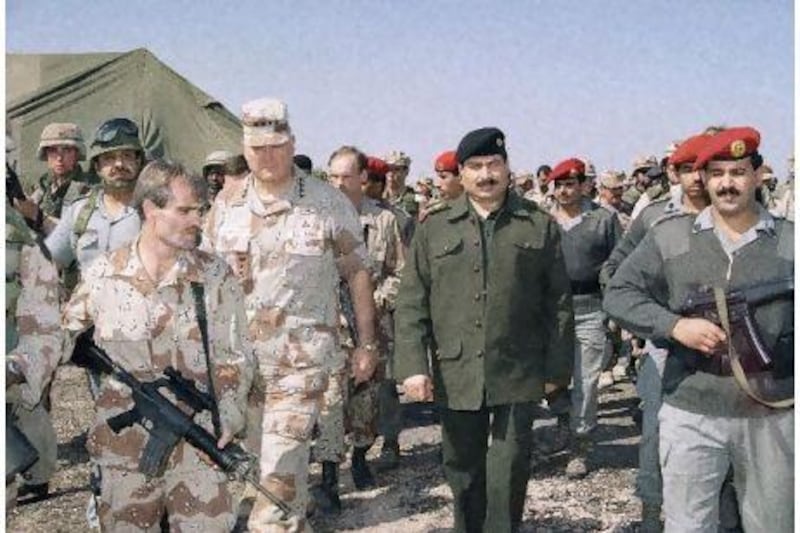BAGHDAD // The transfer of a former Iraqi defence minister, convicted of crimes against humanity, to Baghdad where he is sentenced to death has reopened old wounds and is stoking simmering political tensions.
Sultan Hashim is one of five top officials from Saddam Hussein's regime sentenced to execution by Iraqi courts. Together with two of the former president's half-brothers and dozens of other senior prisoners, he was turned over from US to Iraqi custody this week, bringing the date of his death closer.
But, while there have been limited complaints about the impending execution of members of Saddam Hussein's family, Hashim's case has proven much more controversial, prompting outcry in political circles and among ordinary soldiers.
The objections produced an unusually quick reaction from Iraq's political elite and, on Wednesday, the presidency council announced it had stayed the execution of Hashim and Hussein Rasheed, a former army chief of staff. The reprieve was not extended to other prisoners facing capital punishment.
Hashim's case embodies many of the complex issues of sectarian and ethnic identity, nationalism, modern day politics and history that Iraq continues to struggle to accommodate.
Iraq's Kurdish minority knows the former defence chief as a major figure of the murderous Anfal campaign from 1986 to 1989, when Iraq's military killed as many as 180,000 Kurdish rebels and civilians, carrying out the infamous chemical gas attack on the town of Halabja.
It was for his role in Anfal that Hashim was condemned to death in June 2007.
As a prominent officer during the Iran-Iraq war of the 1980s, the former defence minister also gained powerful enemies in Tehran, which has never forgiven Baghdad for starting the eight-year conflict.
Iraq's current political leadership, headed by Prime Minister Nouri Al Maliki, took a similar view of that war. Mr Al Maliki's Dawa party fought a guerrilla campaign alongside Tehran against Saddam Hussein and, by extension, against Hashim, who was serving as a brigade commander at the time.
Just as powerful Iraqi political blocs revile him over the Iran-Iraq war, Hashim is also venerated for that same role by popular Iraqi nationalist forces.
Rather than seeing a villain allied with a brutal dictator, they see a devoted patriot who fought honourably for his country.
Supporters also dismiss the Anfal accusations, questioning the level of his involvement. Some even quietly recall that Iraqi Kurdish guerrillas had sided with Iran during the war, an act regarded at the time by Baghdad as treachery and deserving of a ruthless military response.
"Executing Sultan Hashim would be a big mistake," said Hassan Al Alawi, a member of parliament from the Iraqiyya bloc. "He is a symbol of the Iraqi army, he was a man of integrity and he is still admired by Iraqi soldiers. Hashim was never a politician, he was not a loyal Baathist but he was a loyal Iraqi."
Mr Al Alawi warned that "dangerous political issues" would be exacerbated unless a solution can be found to Mr Hashim's case that satisfies his backers.
"The Iraqi political process has enough problems at the moment without adding this, it's the last thing we need," he said.
Sectarian undertones are unavoidably present. In broad terms, the Shiite-dominated government and its supporters, including the Kurdish blocs, want the execution to go ahead. Iraqiyya, a reluctant member of the national coalition government with a strong Sunni and nationalist constituency, has made clear its reservations about the punishment.
Crucially, tensions between Mr Al Maliki's ruling bloc and Iraqiyya, his closest rival during last year's elections are currently in a heightened state. Iraqiyya won more seats than the prime minister, but was unable to form a workable majority government.
Iraqiyya says Mr Al Maliki is concentrating authority in his own hands and has reneged on a power-sharing agreement struck as part of the deal allowing him a second term of office. The coalition has been close to collapse for months.
The Hashim case has opened up yet another area of dispute, replete with sectarian and ethnic sensitivity.
"Sentencing against Sultan Hashim was legal and it would frustrate many Iraqis and particularly the Kurdish community if it were to be dropped," said Mahmoud Hassan, a former judge and sitting MP, who said he regretted the politicisation of the case.
Another critical point of consideration is the effect Mr Hashim's sentence has had on the army.
"Officers currently serving in the armed forces look at this and they think to themselves, 'This can happen to me too, I can be sentenced to death in future for carrying out my orders now, if we have a change of political mood'," said Hashim Al Jabouri, a former Iraqi army general who works as an independent military analyst.
"This whole affair is undermining the loyalty of the army which already doesn't really trust the political leadership," he added.
"They wonder why they should stand behind Al Maliki in a difficult situation, they view this sentencing as a gift to Iran to settle old scores."
Among the rank and file who fought during the Iran-Iraq war, Hashim remains highly popular. They see political conspiracy in his imprisonment, not justice.
"He was a humble man, a great leader and he respected us, he was a moral man," said Mohannad Al Wadi, a former conscript who served under Hashim's command.
"I don't think he had anything to do with crimes against humanity, he was a patriot, Iraq should be proud of him."





